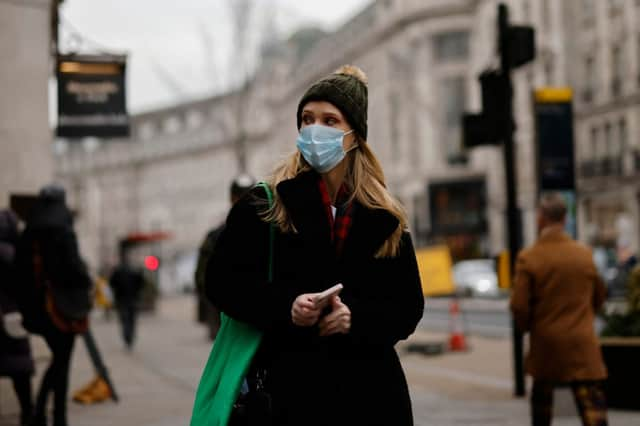Covid pandemic reaching ‘endgame’ - but shouldn’t be treated like flu


The Covid-19 pandemic is approaching its “endgame” in Europe due to the milder Omicron variant, a world health chief has said.
Hans Kluge, the World Health Organisation’s (WHO) Europe director, believes there will soon be global immunity thanks to the vaccine rollout and natural infection.
Advertisement
Hide AdAdvertisement
Hide AdMr Kluge warned that Omicron may infect 60% of Europeans by March, leading to widespread immunity, but warned cases may spike again towards the end of the year.
He said: It’s plausible that the region is moving towards a kind of pandemic endgame.
“There will be, for quite some weeks and months, a global immunity, either thanks to the vaccine or because people have immunity due to the infection.
“So we anticipate there will be a period of quiet before Covid-19 may come back towards the end of the year, but not necessarily the pandemic coming back.”
‘We have to be very careful’
Advertisement
Hide AdAdvertisement
Hide AdWhile the Omicron variant has proved to be more contagious than previous strains, it has also been found to cause less severe symptoms than the likes of Delta that came before it.
However, despite its generally milder symptoms, Mr Kluge has urged countries not to abandon caution altogether and warned it is still possible for other more serious variants to emerge.
He added: There is a lot of talk about endemic, but endemic means that it is possible to predict what’s going to happen.
“The virus has surprised us more than once so we have to be very careful.”
Advertisement
Hide AdAdvertisement
Hide AdHis warning comes ahead of the end of all Covid laws in England on 24 March, after which the nation will learn to live with the virus as it does with flu.
Most coronavirus restrictions in England are due to expire this week, including the use of Covid passes to enter venues and events, and mandatory face masks, but self-isolation rules will continue until late March.
Any relaxations to current travel rules has not yet been announced.
Covid should not be likened to the flu
The WHO has warned that government’s around the world should not suggest that Covid-19 “has suddenly got incredibly weak”, and said it should not be likened to the flu.
Advertisement
Hide AdAdvertisement
Hide AdDr David Nabarro, the WHO’s special envoy for Covid-19, told Sky News: “I keep wondering what the people who make these amazing predictions know that I and my colleagues in the World Health Organisation don’t know.
“You see, what people are seeing from around the world and reporting to the WHO is this is still a very, very dangerous virus, especially for people who have not been vaccinated and who’ve not been exposed to it before.
“It can also mutate and form variants and we’ve seen several but we know there are more not far away.
“So quite honestly, we are not saying that this should be considered to be like flu or indeed like anything else.
Advertisement
Hide AdAdvertisement
Hide Ad“It’s a new virus, and we must go on treating it as though it is full of surprises, very nasty and rather cunning.
“All governments everywhere should not suggest to people that the data have suddenly changed, or the viruses suddenly got incredibly weak.
“Governments have got to set the direction and not shy away from that.”
However, he did agree that the end of Europe’s battle with Covid-19 was “in sight”, but stressed there is still a long way to go.
Advertisement
Hide AdAdvertisement
Hide AdHe added: “The end is in sight, but how long is it going to take to get there? What sort of difficulties will we face on the way? Those are the questions that none of us can answer because this virus continues to give us challenges and surprises.
“It’s as though we’re just passing the halfway mark in a marathon and we can see that yes, there is an end and fast runners are getting through ahead of us.
“But we’ve still got a long, long way to trudge and it’s going to be tough.”